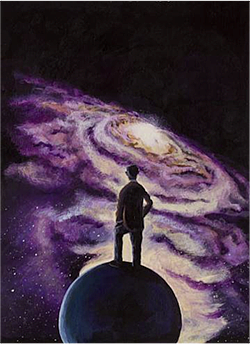Institute for Advanced Study Celebrates Freeman Dyson at 90

Event Explores Dyson’s Contributions to the Sciences and Humanities
PRESS CONTACT: Christine Ferrara, (609) 734-8239
UPDATE, 10/23/13: Videos of all talks are now available on the IAS video webpage.
The Institute for Advanced Study is hosting Dreams of Earth and Sky, a special event celebrating Freeman Dyson’s 90th birthday and his 60th year as a Professor at the Institute. A series of talks presented by leading scientists and scholars will reflect both the diversity of Dyson’s interests, as well as the breadth of research done at the Institute, one of the world’s leading centers for theoretical research and intellectual inquiry.
The program, taking place on September 27-28 at the Institute, includes sessions on mathematics, physics, astronomy and public affairs, with topics ranging from exotic habitable worlds and global warming to ethical clinical trials.
“Founding Director Abraham Flexner visualized the Institute as a place where individuals could follow ‘their own inner light,’” said Robbert Dijkgraaf, Director and Leon Levy Professor at the Institute. “Throughout his sixty years as a Professor, Freeman has embodied that mission, helping to form the School of Natural Sciences, identifying and caring for Members, and embracing a strong spirit of independence and curiosity.”
Dyson’s first visit to the Institute was in 1948–49, and he became a Professor in 1953 before the age of 30. One of his most notable contributions to science was the unification of the three versions of quantum electrodynamics invented by Richard Feynman, Julian Schwinger and Sin-Itiro Tomonaga, achieved at age 24, while at the Institute. Dyson also contributed to works focused on nuclear reactors, solid state physics, ferromagnetism, astrophysics and biology, looking for problems where elegant mathematics could be usefully applied.
Dyson has written a number of books for the general public, including: Disturbing the Universe (1979), Infinite in All Directions (1988), From Eros to Gaia (1992), and The Scientist as Rebel (2006). Dyson, a recipient of the Templeton Prize (2000) and the Henri Poincaré Prize (2012), among other honors, is a fellow of the American Physical Society and the Royal Society of London and a member of the National Academy of Sciences.
Since its inception, the Institute has been dedicated to encouraging the exchange of ideas and providing scholars with the complete freedom to pursue their intellectual curiosity, without pressure for immediate or applied results. Dyson is one of many scholars who have walked the halls of the Institute’s campus in Princeton, New Jersey, including: Albert Einstein, who remained at the Institute until his death in 1955, Kurt Gödel, Erwin Panofsky, Hetty Goldman, John von Neumann, George Kennan, and J. Robert Oppenheimer, who first invited Dyson to the Institute. The Institute can trace the contributions of its Members to major world discoveries and events, including the creation of the world’s first computer, the foundations of game theory and much of the basis of modern theoretical meteorology.
To date, IAS has been home to 33 Nobel Laureates and 38 Field Medalists. The Institute supports the ongoing and ever-evolving pursuit of curiosity, ensuring the cultivation of ideas and the expansion of knowledge.
For more information about the event, including details on how to view live stream broadcasts of the sessions, please visit: http://www.ias.edu/news/dyson-dreams/.
About the Institute for Advanced Study
The Institute for Advanced Study is one of the world’s leading centers for theoretical research and intellectual inquiry. The Institute exists to encourage and support curiosity-driven research in the sciences and humanities—the original, often speculative thinking that produces advances in knowledge that change the way we understand the world. Work at the Institute takes place in four Schools: Historical Studies, Mathematics, Natural Sciences and Social Science. It provides for the mentoring of scholars by a permanent Faculty of approximately 30, and it ensures the freedom to undertake research that will make significant contributions in any of the broad range of fields in the sciences and humanities studied at the Institute.
The Institute, founded in 1930, is a private, independent academic institution located in Princeton, New Jersey. Its more than 6,000 former Members hold positions of intellectual and scientific leadership throughout the academic world. Thirty-three Nobel Laureates and 40 out of 56 Fields Medalists, as well as many winners of the Wolf and MacArthur prizes, have been affiliated with the Institute.